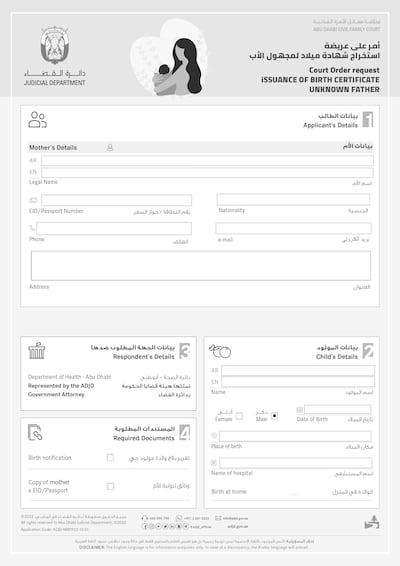Unmarried mothers living in the UAE can apply to get birth certificates for their babies.
A new law that came into effect in October recognises the right of single mothers to register their children without the need for a father or a marriage certificate.
Legal experts say it is a very straightforward process.
Here, The National looks at what mothers need to do if their children are born out of wedlock.
Can any unmarried mother register her newborn?
Yes, the rule applies to all mothers who have babies out of wedlock and the father is not known, said legal expert Hesham Al Rafei.
"This is the first time an Arab country recognises the right of unwed and single mothers to register their children. The law looks at the best interests of the child," Mr Al Rafei said.
What is the application process?
In 2021, Abu Dhabi passed a law that allowed unmarried couples to register their babies if the father was known.
In such cases, a declaration of parentage and a court order through the Abu Dhabi Judicial Department is needed to obtain the child’s birth certificate.
The father and the mother of the child will have to complete and sign the application form, which can be downloaded from the court's website ― https://www.adjd.gov.ae/EN/Pages/nonmuslimsfamilycourt.aspx.
Both parents must sign the declaration at the end of the application form confirming that they are the biological parents of the child.
After this, they need to submit the application and attach a document to prove the birth. If the child was born at home, then they need to mention home birth in the form. A copy of the father's Emirates ID and passport should be attached.
The new law that was passed in October 2022, extends this right to mothers if the father is not known.
In such cases, there is a separate form to fill out. The mother needs to prove the birth and should declare that the father is not known.

She can register the child under her name and fill out her address and contact details, and attach her passport and Emirates ID copy.
The form and the supporting documents can be submitted at any typing centre in the shopping malls or by emailing them to civilfamilycourt@adjd.gov.ae.
Within 48 hours, the mother will receive the court order allowing them to obtain a birth certificate for the baby.
"The process is simple and quick. The court will issue an order within a few days and will send a copy to the department of health," Mr Al Rafei said
Progressive laws
The new federal law was issued by President Sheikh Mohamed bin Zayed under a decree regulating the registry of births and deaths in the UAE.
“The law prioritises the best interest of the child from a humanitarian point of view, irrespective of how and in what circumstances he was born. A child is entitled to a birth certificate, without this document he can't go to school and can't receive medical care,” Mr Al Rafei said.
"The UAE is a cosmopolitan and progressive country. It has one of the most liberal laws in the Middle East, and that's what really matters to expats ― the freedom to marry, divorce, draft a will and the right to equality before the law."
In November 2021, the UAE issued a new family law that decriminalised relationships in which people lived with a partner outside of marriage, or had a baby out of wedlock.
The law consists of 20 articles divided into several chapters covering civil marriage, divorce, joint custody of children and inheritance.
The new law applies only to non-Muslims and Muslims from countries that do not apply Sharia, such as the US and the UK.
Is the rule applicable in all seven emirates?
Yes. In 2021 Abu Dhabi first introduced the new rule to register birth certificates for children born out of wedlock and extended the right to mothers to register the baby without a father this October.
It is now enforced across the country but the courts in other emirates that can issue such orders have not been revealed.







